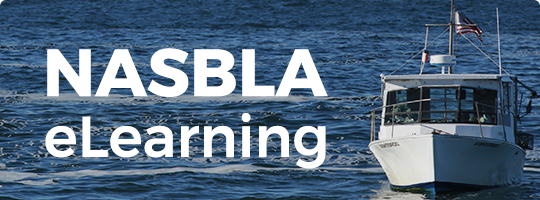Recreational Boating Incident Reporting Policy Webinars March 15 & 20, 2023
This webinar provided an introduction to the U.S. Coast Guard’s Recreational Boating Incident Reporting policy issued January 2023. CG-BSX Policy Letter 23-01, effective for incidents occurring on or after Jan 1, 2024, is intended to provide guidance on the reporting requirements in
33 CFR Part 173 subpart C – Casualty and Accident Reporting
33 CFR part 174 subpart C – Casualty Reporting System Requirements
33 CFR part 174 subpart D – State Reports
In the webinar, Susan Weber, statistician in the U.S. Coast Guard’s Boating Safety Division, presented major policy and terminology changes in reporting and how they are expected to impact report data collection in CY 2024.
Note, the webinar was presented live on two separate days -- March 15 and March 20. Both recordings are available here and are labeled as such.

Susan Weber
Statistician
U.S. Coast Guard Office of Auxiliary & Boating Safety
Susan Weber is a statistician with the U.S. Coast Guard Office of Auxiliary and Boating Safety. Susan manages the national data collection of recreational boating incident reports from state agencies to produce and publish an annual 80-page statistics report.

Tammy Terry
Natural Resources Administrator
Ohio DNR, Div. of Parks and Watercraft, Law Enforcement Section
Tammy Terry graduated from The Ohio State University with a Bachelor of Science degree in Natural Resources. She currently serves as a Natural Resources Law Enforcement Program Manager for the Ohio Department of Natural Resources, Division of Watercraft, where she has been employed since 1994. Terry is a long-time member of NASBLA’s Engineering, Reporting, and Analysis Committee and is currently serving her second term as chair of the committee.



[Regarding the BARD-Web screens and proposed graying out of terms that will not be in use as of Jan. 1, 2024] Rather than greying it out is there a way to hide it on future reports. I suspect officers will start calling saying the system is broken because an option that is visible is not able to be checked.
*Question submitted by Cody Jones, Texas Parks & Wildlife Dept. during the March 20, 2023 live webinar.
[Regarding the BARD-Web screens and proposed graying out of terms that will not be in use as of Jan. 1, 2024] Rather than greying it out is there a way to hide it on future reports. I suspect officers will start calling saying the system is broken because an option that is visible is not able to be checked.
*Question submitted by Cody Jones, Texas Parks & Wildlife Dept. during the March 20, 2023 live webinar.
Response from Susan Weber during March 20, 2023, live webinar (paraphrased): That can be considered. However, the concern is that removing them will inhibit the ability [of a user] to look at older records that use those terms; no value would be displayed. Another possibility might be placing a banner at the top explaining why they are grayed out and unable to be selected.
Four attendees of the March 15, 2023 webinar had questions or expressed concerns about the policy letter's guidance on data collection for damages to the vessel or other property (4.h)--specifically excluding labor costs in the calculation to determine if an incident met the $2,000 threshold [4.h: The data collection on damages should not include the cost to repair (i.e., does not include labor) the recreational vessel(s) involved.]
Response from Susan Weber during March 15, 2023, live webinar (paraphrased):The "cost to repair" was part of the project workgroup's extensive discussions on the damage threshold, including how labor costs can vary dramatically; but the group's recommendations {voted on by NASBLA member states] did not specify the exclusion. The consideration of variations in labor cost, however, was part of the reason why the policy letter favors the exclusion in the interest of getting more consistency in reporting.
However, Susan is interested in gathering more feedback from states on this matter --- do others also foresee an issue in being able to separate out the labor costs?
Attendee asked for clarification about the policy letter classifying Float Tubes as a “non-vessel” (5b(14)) when in the past a letter had been issued from the Coast Guard determining a Float Tube to be a vessel.
*Question asked by Matt Stowers, Washington State, during the March 20, 2023, live webinar
Response from Susan Weber during March 20, 2023, live webinar (paraphrased): Likely [CG-BSX] will convene internally to address how they want to handle the policy change and clarify [per the policy letter] that Float Tubes propelled only by feet or fins should not be considered a vessel.
Attendee seeking confirmation re understanding of the medical exclusion (5b(6) in the policy letter): if operator suffers (for example) a heart attack, but nothing else happens, it is not reportable, correct?
*Question asked by Scott Szczepaniak, U.S. Coast Guard during the March 15, 2023, live webinar
Response from Susan Weber during March 15, 2023, live webinar (paraphrased): Given the description it sounded like it would not be a reportable incident. However, if another underway vessel was involved it might be. For example, the V1 operator has a heart attack and is incapacitated; V2, also underway, impacts V1; this would be considered reportable because V2 had an opportunity to take evasive action to avoid collision.
Can you expand on generator...a separate plug-in for heating?
*Question submitted by MariAnn McKenzie - Oregon State Marine Board during the March 20, 2023 live webinar.
What about incidents that are in federal waters were there is no state jurisdiction. Who is the responsible party to report?
*Question submitted by Cody Jones - Texas Parks & Wildlife Dept. during the March 20, 2023 live webinar.
Response from Susan Weber during March 20, 2023, live webinar (paraphrased): The Coast Guard. Ultimately, the USCG would be responsible for tracking down information if the incident occurred on a body of water that was sole federal.
For scenario of collision with fixed object, would the information about the vessel that is moored to a dock (owner/operator/other vessel specific information) need to be collected?
*Question submitted by Stacey Brown - Virginia Dept. of Wildlife Resources during the March 20, 2023 live webinar.
Response from Susan Weber during March 20, 2023, live webinar (paraphrased): Best Practices work [coordinated through ERAC] will provide additional guidance. [Expect that] draft answers will be vetted and CG-BSX will approve.
In the past, even though a person was not transported [to a medical facility], it would still count as a injury. So now we do not document that on the report?
*Question submitted by MariAnn McKenzie - Oregon State Marine Board during the March 20, 2023 live webinar.
Response from Susan Weber during March 20, 2023, live webinar (paraphrased): [To clarify] if asking whether a person who is not transported would meet the threshold, in January 2024, the answer is “no.” The three conditions [in 4a. of policy letter] would need to be met [treatment; by medical professional; at licensed medical facility].
In regards to labor, in Oregon an aluminum jet boat bottom replacement after impacting rocks is $10,000 - $15,000 to make the boat operational, but only about $1,500 of that is materials at most.
*Question submitted by Brian Paulsen - Oregon State Marine Board during the March 15, 2023 live webinar.
I think it would be even more burdensome to investigator to exclude labor from the repair cost. Just focus on what it is going to take to get the vessel back in operation.
*Question submitted by Ty Hunter - Utah State Parks during the March 15, 2023 live webinar.
Will these updates/changes be reflected in BARD Web by 2024?
*Question submitted by Stephanie Weatherington - Arkansas Game & Fish Commission during the March 15, 2023 live webinar.
Response from Susan Weber during March 20, 2023, live webinar (paraphrased): Complicated answer [because BSX] needs to update both the CG-BAR form and BARD-WEB. [Updating the] BAR form is a long process because [BSX needs] to work with a couple of other USCG offices, DHS and OMB to get the form through a public comment period and approved. [That process] could take a year; however, we’ve seen it go longer and shorter. With the BARD-WEB system, there is a scope of work [with the vendor] to make updates to the state BARD-Web screens. [Question is:] can we update the system without updating the BAR form? If yes, then [BSX] will be able to get the changes into BARD Web before the implementation date.
Correction: Response was given during March 15, 2023, live webinar.
Will this information be available on the NASBLA website to cross reference changes on our report.
*Question submitted by Joseph Keeton - South Dakota Dept. of Game, Fish & Parks during the March 15, 2023 live webinar.
Response from Ron Sarver during March 15, 2023 webinar (paraphrased): This information will be available; it will be included in the eLearning Center, and ERAC will be working on a number of reference materials for the states to use as [the states] make these changes over the coming year.
Response from Ron Sarver during March 15, 2023 webinar (paraphrased): This information will be available; it will be included in the eLearning Center, and ERAC will be working on a number of reference materials for the states to use as [the states] make these changes over the coming year.
What is considered equipment? You mentioned fishing poles and other equipment do not count towards meeting the reportable threshold. What about items that are affixed to the boat, for example fish finders, GPS units.
*Question submitted by Eric Deneault - Kansas Wildlife & Parks during the March 15, 2023 live webinar.
Response from Susan Weber during March 15, 2023, live webinar (paraphrased): Will follow up with all. [Best Practices work (coordinated through ERAC) will provide additional guidance.]
When does the policy take effect?
January 1, 2024